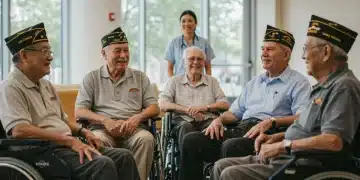Fight veterans benefit overview: what you need to know

Veterans can access various benefits, including healthcare, education assistance, and disability compensation, through government agencies and non-profit organizations designed to support their needs.
Fight veterans benefit overview is crucial for understanding the resources available to our brave servicemen and women. Are you aware of what support systems are out there for veterans? Let’s explore how these benefits can truly make a difference.
Understanding veterans benefits
Understanding veterans benefits is essential for those who have served in the military. Many veterans may not realize the full range of support available to them after their service. This overview will shine a light on the different types of benefits accessible to veterans.
Types of Benefits
Veterans can access various benefits that can improve their quality of life. These benefits include:
- Healthcare services: Many veterans are eligible for comprehensive healthcare through the Department of Veterans Affairs.
- Education assistance: Programs like the GI Bill help veterans pay for higher education and vocational training.
- Disability compensation: Veterans with service-related injuries may receive monthly payments based on their disability rating.
Additionally, veterans might qualify for housing assistance through various programs designed to help find affordable living options. Each benefit serves a unique purpose, catering to the specific needs of veterans.
How to Access These Benefits
Applying for veterans benefits can seem daunting, but the process has been streamlined in many cases. It’s important to gather necessary documents, such as discharge papers and medical records, before starting the application.
Many veterans find that contacting a local Veterans Affairs office can provide valuable help. They can guide veterans through the application process and ensure they receive the benefits they deserve. Understanding the eligibility criteria is crucial.
Organizations like the Veterans of Foreign Wars (VFW) and the American Legion can also offer assistance in navigating these resources. These groups often have trained service officers who can advocate for veterans and help them maximize their benefits.
Staying informed about updates to policy changes or benefits can make a significant difference. Many veterans might also consider joining support groups or forums to share experiences and tips with each other.
Key types of benefits available
When exploring veterans benefits, it’s important to understand the key types available. Each type is designed to help veterans meet specific needs during their transition to civilian life. Knowing these can lead to significant improvements in daily living.
Healthcare Benefits
Healthcare is one of the most critical areas where veterans receive support. The Department of Veterans Affairs provides various options, such as:
- VA Medical Centers: Access to hospitals and outpatient clinics.
- Prescription Drugs: Coverage for necessary medications.
- Mental Health Services: Support for PTSD and other mental health conditions.
This comprehensive healthcare system aims to ensure that veterans lead healthy lives after their service.
Education Benefits
Another major benefit is education assistance. Programs like the GI Bill can cover:
- Tuition and Fees: Financial aid for college and vocational training.
- Housing Allowance: Financial help for living expenses while studying.
- Transfer of Benefits: Ability to transfer unused educational benefits to family members.
These education benefits empower veterans to pursue their academic and career goals, fostering personal growth and success.
Disability Compensation
Veterans with service-related injuries can qualify for disability compensation. This support includes:
- Monthly Payments: Based on their disability rating.
- Special Monthly Compensation: Additional payments for severe disabilities.
This financial assistance is vital for those who may need ongoing medical care or support due to their disabilities.
Furthermore, there are housing benefits, unemployment assistance, and pension programs tailored for low-income veterans. By exploring these types of benefits, veterans can navigate the resources available to enhance their quality of life.
How to apply for veterans benefits

Applying for veterans benefits can feel overwhelming, but understanding the process makes it easier. Veterans should begin by gathering all necessary documents, including discharge papers, identification, and any medical records that support their application.
Step-by-Step Application Process
The first step is to determine which specific benefits you want to apply for. The Department of Veterans Affairs (VA) offers a variety of programs, including healthcare, education, and disability compensation. Once you know your desired benefits, start your application.
- Online Application: Many veterans choose to apply through the VA’s website. This method is often the fastest and most convenient.
- Paper Application: If you prefer, you can fill out a paper application, which can be mailed to the VA.
- In-Person Assistance: Visiting a local VA office can provide face-to-face guidance. Trained staff can help you fill out your application.
After submitting the application, it’s essential to keep track of your status. The VA usually provides a confirmation of receipt and may follow up with requests for additional information.
Important Tips
Being organized and proactive can significantly help in this process. Here are some tips to keep in mind:
- Double-check documents: Ensure all your paperwork is complete and correctly filled out to avoid delays.
- Be patient: Processing times can vary, so it’s important to remain patient while your application is reviewed.
- Seek help if needed: Don’t hesitate to reach out to veteran services organizations if you have questions about the application process.
With the right preparation, veterans can successfully navigate the application for benefits and access the support they deserve. Remember, every step forward is an important one towards finding the right resources for you.
Common challenges in accessing benefits
Accessing veterans benefits comes with its share of challenges, and many veterans may encounter roadblocks along the way. Understanding these common issues can help veterans prepare and navigate the system more effectively.
Identification of Eligibility
One major challenge is determining eligibility for specific benefits. Many veterans are unaware of their qualifying factors, such as service length or discharge status. This uncertainty can prevent them from accessing valuable resources.
Complicated Application Process
The application process for veterans benefits can be extensive and confusing. Veterans often need to fill out complex forms and provide detailed supporting documents. This complexity can lead to errors, further delaying the approval of benefits.
- Time-consuming paperwork: Gathering the necessary documents can be overwhelming, especially for those who have been out of the service for years.
- Lengthy waiting periods: Once submitted, the approval process can take months, causing frustration.
- Need for follow-ups: Sometimes applications require additional information, which can slow down the process.
Many veterans find themselves unsure about what to do next or how to track their application status effectively.
Lack of Awareness and Support
Another challenge is a lack of awareness about available programs. Some veterans may not know what benefits they qualify for or how to access them. Organizations that support veterans, such as the American Legion and VFW, can play a vital role in providing information and advocacy.
Additionally, there is often a stigma associated with seeking help, leading some veterans to forgo valuable resources. It’s crucial for veterans to understand that seeking assistance is a positive step toward improving their circumstances.
By recognizing these challenges, veterans can arm themselves with the knowledge needed to overcome obstacles and effectively pursue the benefits they deserve.
Resources for veterans assistance
There are numerous resources available for veterans seeking assistance. These resources can provide vital support in various areas, including healthcare, education, and financial aid. Understanding how to access these resources is crucial for leveraging the benefits that are available.
Government Resources
The U.S. government offers a wide range of benefits tailored specifically for veterans. The Department of Veterans Affairs (VA) is the primary agency providing these services. They help veterans navigate healthcare services, disability compensation, and educational benefits.
- VA Healthcare: Provides healthcare services through a network of medical facilities across the country.
- Veterans Benefits Administration: Manages various benefits like education assistance and vocational rehabilitation.
- National Cemetery Administration: Offers burial benefits and memorial services for veterans.
In addition to the VA, many state governments have their own departments focused on veteran services, which can offer local resources and support.
Non-Profit Organizations
Several non-profit organizations can provide valuable assistance to veterans. These organizations often fill gaps in services where the government may not reach as effectively.
- American Legion: Offers support for veterans’ needs and advocates for veterans’ rights.
- Veterans of Foreign Wars (VFW): Provides assistance in claims, scholarships, and local community support.
- Wounded Warrior Project: Focuses on helping veterans who have been injured during service, offering programs for recovery and rehabilitation.
These organizations are committed to improving the lives of veterans and their families.
Local Community Resources
Many communities have local groups and services dedicated to helping veterans. These resources can include:
- Veteran Service Officers (VSOs): Professionals who can guide veterans through accessing benefits and assist with paperwork.
- Support Groups: Offer a space for veterans to connect and share experiences, reducing feelings of isolation.
- Job Fairs and Employment Support: Local organizations often host job fairs specifically for veterans, helping them to find fulfilling careers.
By tapping into these resources, veterans can find the support they need to successfully reintegrate into civilian life.
In summary, understanding and accessing veterans benefits is vital for all veterans. The journey may be filled with challenges, but numerous resources are available to assist along the way. From government agencies to local support organizations, veterans can find help tailored to their specific needs. By staying informed and proactive, veterans can maximize their access to benefits and improve their quality of life. Connecting with fellow veterans and advocates strengthens this pursuit and helps create a supportive community.
FAQ – Frequently Asked Questions about Veterans Benefits
What types of benefits are available for veterans?
Veterans can access various benefits including healthcare services, education assistance, and disability compensation.
How can I apply for veterans benefits?
You can apply online through the VA’s website, by submitting a paper application, or by visiting a local VA office for assistance.
What common challenges do veterans face when accessing benefits?
Common challenges include determining eligibility, dealing with lengthy application processes, and a lack of awareness about available resources.
Where can I find support and assistance for veterans?
Support can be found through government agencies, non-profit organizations, and local community resources designed to assist veterans.





